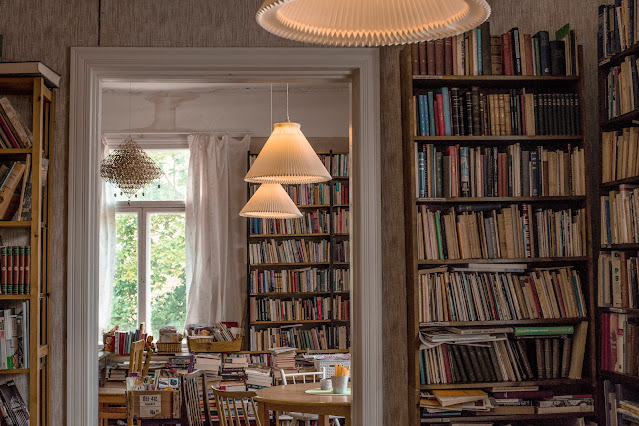The In or Out Tag
Let's have a good round of bookish Q&A, shall we? I'm borrowing this tag from Rachel over at The Edge of the Precipice. The idea is to give your vote on various bookish tropes and design elements; it's jolly good fun. There are no rules and no tagging protocols, so, let's just dive in!
Reading the Last Page First | IN and OUT. It really depends. I used to do it a lot when I was younger, actually. Now it's rarer, but I'm not opposed to it on principle.
Dream Sequences | OUT, I guess. I mean, they can be cool every now and then, but for the most part . . . eh. Just don't care for 'em.
Love Triangles | IN. They don't bother me. As long as they make sense for the story, I'm down.
Cracked Spines | IN. I prefer paperbacks to hardcovers on the whole, and I often need to crack the spine of a paperback at some point in order to make the book easier to hold. I don't always love the way it looks, but I almost always like the way it feels, and practicality will usually win out for me in any contest. Plus, I'm a staunch supporter of well-loved books looking the part — I like 'em worn and weathered and slightly misshapen.
Back to My Small Town | OUT, for the most part. I just don't care.
No Paragraph Breaks | OUT, you sociopath.
Multi-generational Sagas | OUT. Family dynamics and family dysfunction bore and depress me. I've had enough of both in my own life, thank you very much. Plus, I'm starting to think that maybe generational sagas smack of clannishness, to me. Like, why should I care that much about this particular fictional family? What makes these people special simply because they belong to this specific bloodline? (I know that most generational sagas aren't really insinuating that these characters are abnormally special; it's just that this story structure rubs me the wrong way.)
Monsters Are Regular People | IN, if we're speaking in general existential "turns out we were the real monsters all along" terms. As Cornelia Funke so aptly put it in Inkheart: "There are many monsters in this world, most of them human and all of them mortal."
No Paragraph Breaks | OUT, you sociopath.
Multi-generational Sagas | OUT. Family dynamics and family dysfunction bore and depress me. I've had enough of both in my own life, thank you very much. Plus, I'm starting to think that maybe generational sagas smack of clannishness, to me. Like, why should I care that much about this particular fictional family? What makes these people special simply because they belong to this specific bloodline? (I know that most generational sagas aren't really insinuating that these characters are abnormally special; it's just that this story structure rubs me the wrong way.)
Monsters Are Regular People | IN, if we're speaking in general existential "turns out we were the real monsters all along" terms. As Cornelia Funke so aptly put it in Inkheart: "There are many monsters in this world, most of them human and all of them mortal."
Artificial Intelligence | IN. Why not? It's fun. Of course, I typically get my "AI" in the form of abstract concepts made into anthropomorphic entities, like Death in The Book Thief or the Discworld novels, but robots and other "inanimate" objects can be fun, too.
Drop Caps | IN. Adds a dash of good old-fashioned storybook whimsy, eh, what?
Happy Endings | IN, of course. "They're quite my favorite sort." 😉 Although, there are many different kinds of happiness, and thus many different kinds of happy endings. Thoughts?
Plot Points That Only Converge at the End | IN, but, like Rachel, I have to add that I prefer the book in question to not be too lengthy. And it really depends on who is spinning said plot points. For instance, I love the way that Patricia A. McKillip weaves her threads together at the end of some of her novels; I'm not as enthused about Charles Dickens' methods.
Detailed Magic Systems | IN. I mean, sure. My level of attention to said system will depend upon the level of said detail, but I've nothing against it.
Unreliable Narrators | IN. It can be such a fascinating stylistic and thematic device! In fact, a couple of my favorite books employ a form of unreliable narration, in my opinion: The Age of Innocence and The Princess Bride.
Evil Protagonists | OUT, I assume. I can't think of a scenario in which I would want to experience an entire story from the perspective of a genuinely evil protagonist. That's one form of unreliable narration that I don't think I'd savor. We are not about, for example, the Humbert Humberts of the world. [Sidetracking into a super fun story: several months ago, I was (very briefly) flipping through my library's copy of Lolita when I noticed that the synopsis on the inside cover flap referred to it as, and I quote, a "love story". 🙃🙃🙃 So that was delightful.]
The Chosen One | IN, but only if it's done well. It can start to feel like a forced shtick sometimes.
When the Protagonist Dies | OUT overall, but it can be done well.
Really Long Chapters | OUT. Give me frequent and reasonable stopping places. I have work in the morning.
Deckled Edges | IN, though I don't love them as much as a lot of people do. They're fine, they're nice at times, but they can also be a little distracting and irksome.
Signed Copies by the Author | IN. Always a perk!
Dog-Earing Pages | IN. I do it all the time. As I said, I think books should be "lived-in". 😉 Although, I will admit that I don't do it with every book. It depends on the quality of the pages, which particular book it is, etc.
Chapter Titles Instead of Numbers | OUT. I don't mind chapter titles with numbers, depending on the story, but I do want the numbers as well.
There you have it! Sound like something you'd like to do on your blog? If so, here's a clean list of the items for your copying ease:
Enemies to Lovers
Dream Sequences
Love Triangles
Cracked Spines
Back to My Small Town
No Paragraph Breaks
Multi-generational Sagas
Monsters Are Regular People
Re-Reading
Artificial Intelligence
Drop Caps
Happy Endings
Plot Points That Only Converge at the End
Detailed Magic Systems
Classic Fantasy Races
Unreliable Narrators
Evil Protagonists
The Chosen One
When the Protagonist Dies
Really Long Chapters
French Flaps
Deckled Edges
Signed Copies by the Author
Dog-Earing Pages
Chapter Titles Instead of Numbers
⸻
Did any of my answers surprise you?
How would you answer?
What constitutes a "happy ending" in your mind?









Sorry, weird typo. Let's try again!
ReplyDeleteWhat I was TRYING to say was--as a general rule, I love multi-generational sagas, but I HAVE encountered at least one which DID strongly hint that this particular family was more special than any other family, and that's why you should care about their story. Which, no thank you!
If it was a fantasy story where the family had special magic powers or produced Chosen Ones on the regular, I could kiiiiiiiiiiiiiind of see it--but it wasn't, it was just an ordinary American family in a historical fantasy setting. But you see, they were white middle-class Protestants and that made all the difference ;)
Gotta love technology. ;-P
DeleteOkay, this is another good point about multi-generational sagas. In cases like Encanto, for instance, where there actually is a legitimate reason to regard the family as "more special" than others . . . I mean, that's fair. I still don't love it because it's just boring to me, but it's fair. xD
But yes: white middle-class Protestant does not "special" constitute. xD
This was fun, here are my answers
ReplyDeleteNice! Looking forward to reading your answers.
Delete*gasps* You dog-ear pages?!!! That is the one thing that I cannot stand, but I do see why it is so handy. I can never find a bookmark...
ReplyDeleteI do, alas, I must admit! But I never do it as a substitute for bookmarking, weirdly -- only as a way of marking passages that I want to return to later.
Delete